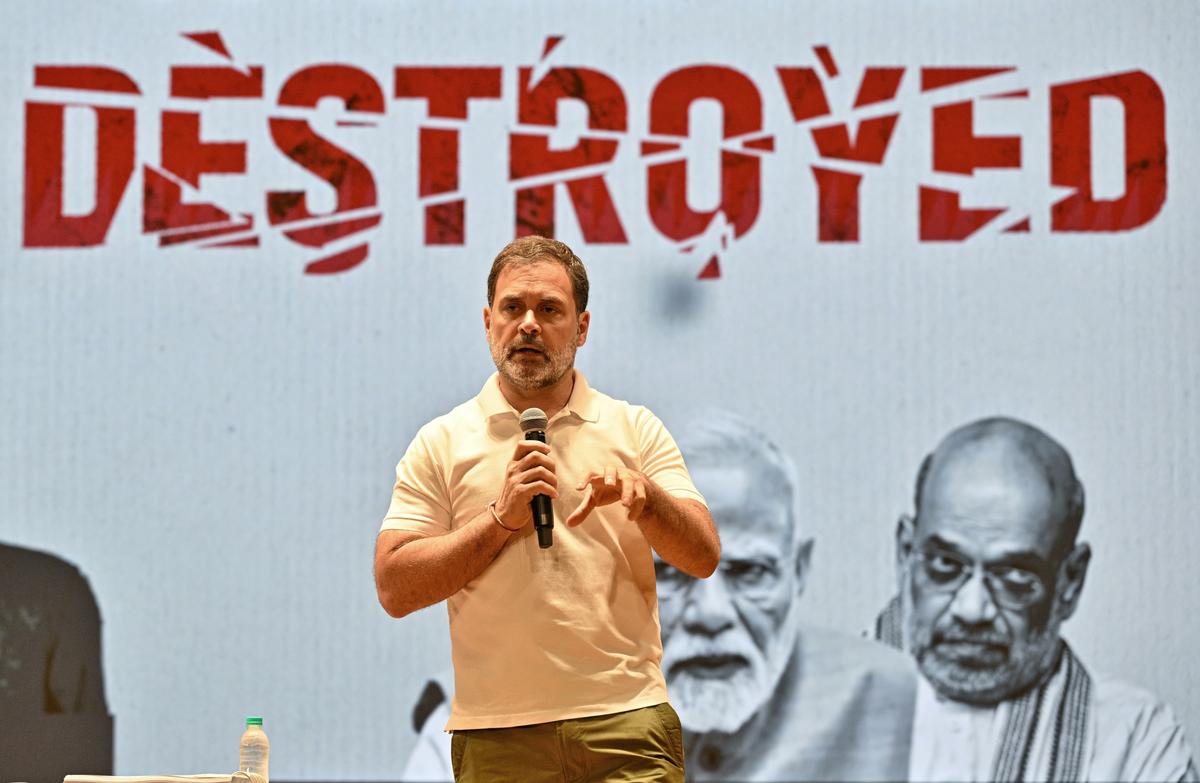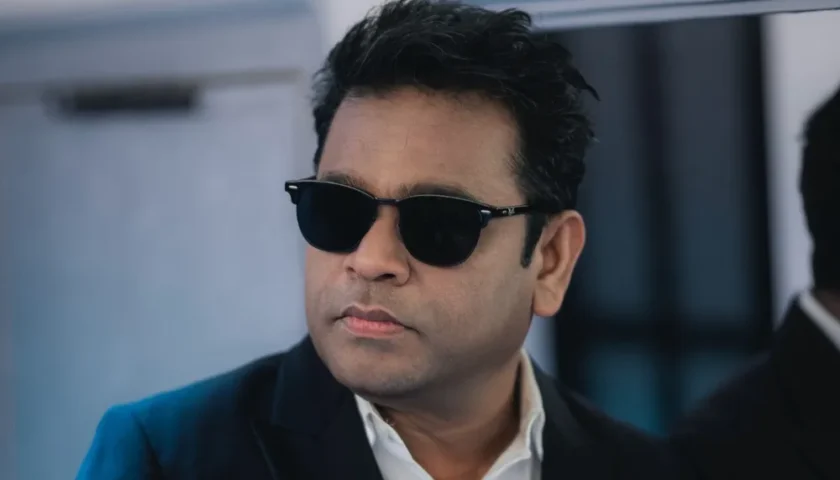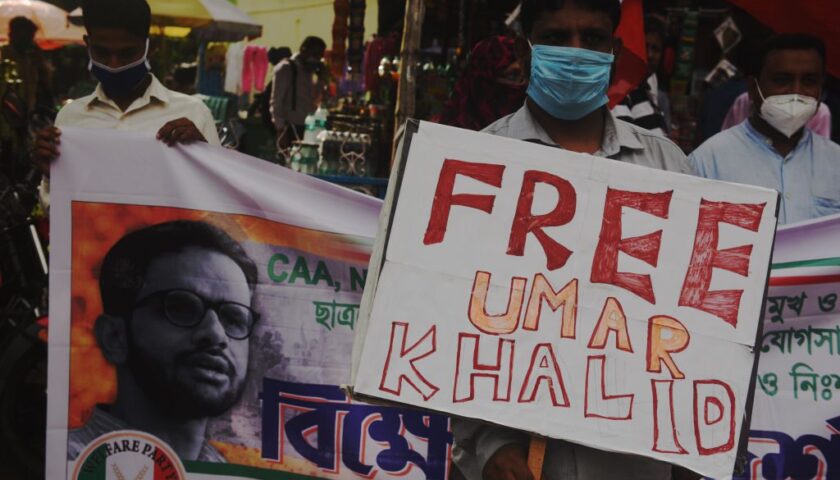A Political Detonation in Patna
By: Javid Amin | 01 Sep 2025
In Indian politics, metaphors are often weapons, but rarely do they arrive with the nuclear intensity of Rahul Gandhi’s latest declaration.
Speaking in Patna at the culmination of the Voter Adhikar Yatra on September 1, Gandhi told a charged crowd:
“Earlier, you saw the atom bomb. Now, a hydrogen bomb of revelations is coming on vote chori. After this, Narendra Modi will not be able to show his face to the country.”
This statement, layered with drama, anger, and political theatre, is more than just rhetoric. It marks a strategic escalation by the Congress and the INDIA bloc ahead of key state elections and the 2024 parliamentary narrative reset.
Atom Bomb vs Hydrogen Bomb: Why the Rhetoric Matters
Rahul Gandhi’s choice of words is not accidental.
-
Atom bomb (past exposés): Earlier revelations on electoral roll irregularities, EVM suspicions, and crony capitalism were presented as serious but not decisive.
-
Hydrogen bomb (future exposé): A hydrogen bomb is exponentially more destructive — symbolizing something so overwhelming that it could destabilize the ruling government’s credibility at its core.
By framing it this way, Gandhi:
-
Raises expectations for a massive revelation.
-
Creates media suspense and builds a narrative crescendo.
-
Signals that the Congress has documentary evidence of vote theft, not just rhetorical allegations.
The Core Allegation: Vote Chori as Theft of Democracy
According to Gandhi, vote chori (vote theft) is not just an election malpractice issue — it is a structural robbery of democracy itself.
He framed it in multiple dimensions:
-
Voter List Manipulation – particularly in Mahadevapura (Karnataka) and parts of Maharashtra, where Congress alleges names were deliberately deleted or altered.
-
Democratic Rights Theft – “Vote chori is the theft of your ration, your land, your employment, your services.”
-
Youth-Oriented Framing – warning young voters that stolen elections mean stolen opportunities and stolen futures.
-
Constitutional Betrayal – portraying electoral malpractice as an assault on the soul of the Indian Constitution.
This framing is strategic: it broadens the issue beyond technical election irregularities into a moral crisis for every citizen.
The INDIA Bloc Rally: A United Opposition Front
The Patna rally was not just about Rahul Gandhi. It showcased INDIA bloc unity, with leaders from:
-
Congress
-
RJD (Rashtriya Janata Dal)
-
CPI
-
TMC (Trinamool Congress)
-
Shiv Sena (UBT)
The slogan echoed by the crowd was sharp and direct:
“Vote chor, gaddi chhodd” (Vote thief, vacate the throne).
This reflects a two-pronged INDIA strategy:
-
Delegitimize Modi’s electoral victories by questioning their fairness.
-
Unify diverse regional leaders under a single battle cry of democracy vs dictatorship.
BJP’s Counterattack: Dismissing the Bombs
The BJP wasted no time in hitting back.
-
Ravi Shankar Prasad dismissed Gandhi’s remarks as “irresponsible theatrics”, asking:
“If Rahul Gandhi has proof, why doesn’t he submit affidavits to the Election Commission?”
-
BJP leaders mocked the “bomb metaphors” as political gimmickry designed to grab headlines rather than provide substance.
-
They accused the Congress of manufacturing excuses for electoral losses, claiming voters rejected the party, not democracy.
This shows the BJP’s strategy:
-
Ridicule Gandhi’s rhetoric to deflate its impact.
-
Shift the burden of proof back to Congress.
-
Reinforce the image of Modi as a leader who wins legitimately through popular mandate.
Past Controversies: A Pattern of Allegations
Rahul Gandhi’s latest claim fits into a larger pattern of opposition doubts about India’s electoral process:
-
EVM Tampering Allegations – long-standing suspicions, though never officially proven.
-
Voter List Purges – reports in Karnataka and Telangana of names being selectively deleted.
-
Election Funding Transparency – controversies around electoral bonds favoring the BJP.
By calling this exposé a hydrogen bomb, Gandhi seeks to tie these strands into a comprehensive narrative of systemic fraud.
Political Implications Ahead of Elections
This escalation could have multiple consequences:
-
Rallying the Opposition Base – Energizing Congress supporters and INDIA bloc voters who feel democracy is under siege.
-
Raising Stakes for BJP – Forcing Modi and his party to either dismiss or directly counter the allegations.
-
Influencing Youth Voters – By connecting vote theft to employment and services, Gandhi is targeting the 18–35 demographic.
-
Setting the Agenda – Ensuring that electoral integrity becomes a central campaign issue ahead of state elections.
The Democracy Debate: National & Global Stakes
India, often called the world’s largest democracy, faces reputational risks when opposition leaders openly allege vote theft at scale.
-
International observers may question the credibility of India’s electoral process.
-
Domestically, voter trust may erode, leading to apathy or anger.
-
The government risks being seen as authoritarian if it dismisses allegations without transparent inquiry.
Thus, Gandhi’s “hydrogen bomb” statement isn’t just rhetoric — it’s a direct challenge to India’s democratic image at home and abroad.
Bottom-Line: Bombshell or Bluff?
Rahul Gandhi’s promise of a “hydrogen bomb of revelations” has already achieved one thing: it has dominated the political conversation.
Whether it becomes a game-changing exposé or fizzles out as political exaggeration will depend on:
-
The evidence Congress actually produces.
-
The response of institutions like the Election Commission.
-
How effectively the BJP counters the narrative.
For now, the stage is set for an explosive political season — one where the very credibility of India’s elections will be debated as fiercely as jobs, prices, and welfare.




